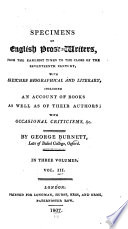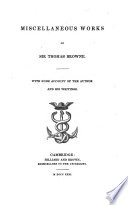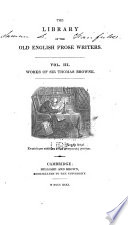 | sir Thomas Browne - 1754 - 420 pages
...was made to be inhabited by beafts, but ftudied and contemplated by man: it is the debt of our reafon we owe unto God, and the homage we pay for not being beafts; without this the world is ftill as tho' it had not been, or as it was before the fixth day,... | |
 | George Burnett - 1807 - 548 pages
...effects of nature; there is no danger to profound these mysteries, no " sanctum sanctorum" in philosophy. The world was made to be inhabited by beasts, but studied and contemplated by man: it is the debt of our reason we owe unto God, and the homage we pay for not being beasts; without this,... | |
 | George Walker - 1825 - 668 pages
...effects of nature : there is no danger to profound these mysteries, no sanctum sanctorum in Philosophy : the world was made to be inhabited by beasts, but studied and contemplated by man : it is the debt of our reason we owe unto God, and the homage we pay for not being beasts ; without... | |
 | 1831 - 370 pages
...of nature. There is no danger to profound these mysteries, no " sanctum sanctorum " in philosophy. The world was made to be inhabited by beasts, but studied and contemplated by man : 't is the debt of our reason we owe unto God, and the homage we pay for not being beasts. Without... | |
 | Sir Thomas Browne - 1831 - 362 pages
...of nature. There is no danger to profound these mysteries, no " sanctum sanctorum " in philosophy. The world was made to be inhabited by beasts, but studied and contemplated by man : 't is the debt of our reason we owe unto God, and the homage we pay for not being beasts. Without... | |
 | 1848 - 780 pages
...life as an experience full of significance is every where obvious in Browne. " The world," he says, " was made to be inhabited by beasts, but studied and contemplated by man ; it is the debt of our reason we owe unto God and the homage we pay for not being beasts. The wisdom... | |
 | Sir Thomas Browne - 1835 - 592 pages
...effects of nature. There is no danger to profound9 these mysteries, no sanctum sanctorum in philosophy.1 The world was made to be inhabited by beasts, but studied and contemplated by man :e 't is the debt of our reason we owe unto God, and the homage we pay for not being beasts. Without... | |
 | Sir Thomas Browne - 1835 - 596 pages
...effects of nature. There is no danger to profound9 these mysteries, no sanctum sanctorum in philosophy.i The world was made to be inhabited by beasts, but studied and contemplated by man:2 't is the debt of our reason we owe unto God, and the homage we pay for not being beasts. Without... | |
 | William Gifford, Sir John Taylor Coleridge, John Gibson Lockhart, Whitwell Elwin, William Macpherson, William Smith, Sir John Murray IV, Rowland Edmund Prothero (Baron Ernle) - 1851 - 570 pages
...The world was made to be inhabited by beasts, but studied and contemplated by man : 't is the debt of reason we owe unto God, and the homage we pay for not being beasts. Without this, the world is still an though it had not been, or as it was before the sixth day, when as yet there was not a creature... | |
 | 1839 - 586 pages
...\3ftt Light Dragoons. It is the remark of the eminent philosopher and physician Sir Thomas Browne, that the world was made to be inhabited by beasts, but studied and contemplated by man. The world is here referred to in a general sense, including the whole world of nature — not in that... | |
| |